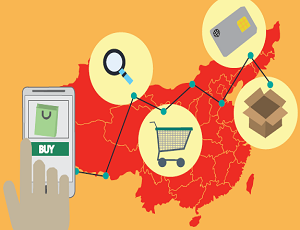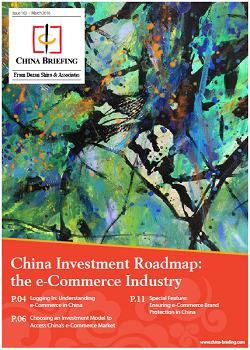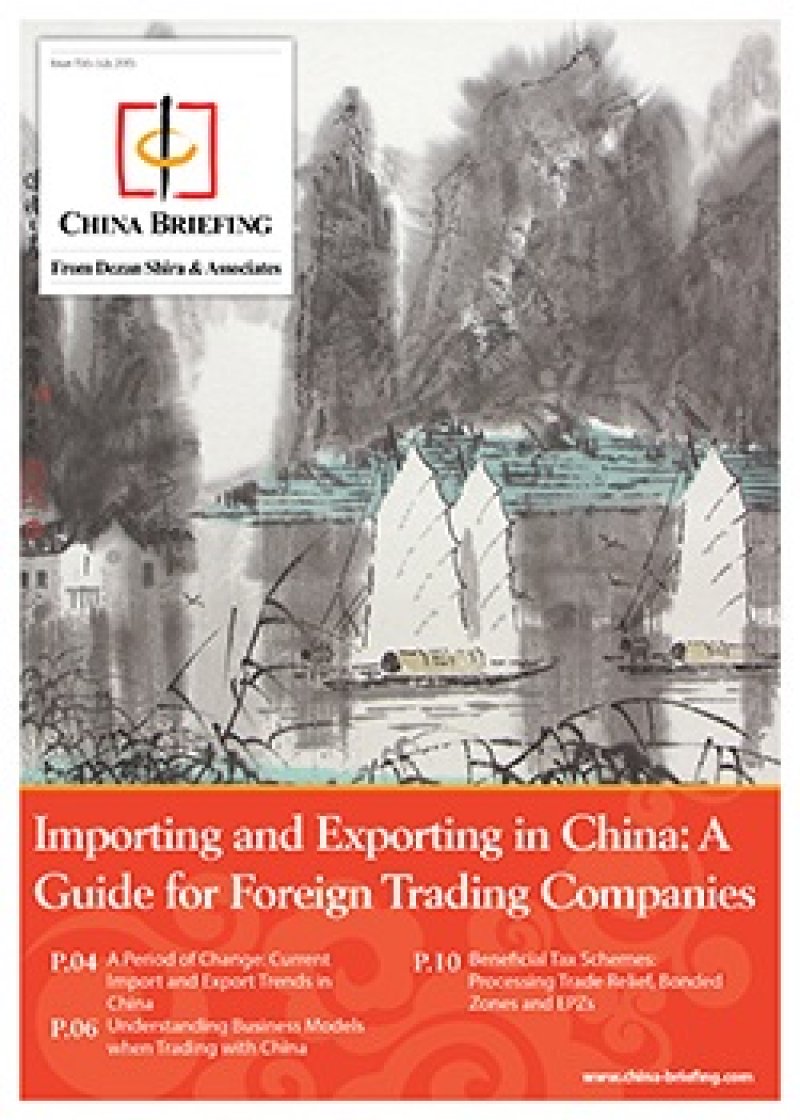How to Choose a Third-Party When Entering China’s e-Commerce Market
 By Dezan Shira & Associates
By Dezan Shira & Associates
Editor: Alexander Chipman Koty
With e-commerce exploding across China, businesses from around the world are flocking to enter the fray. According to a study by Accenture and AliResearch, China is expected to become the largest cross border B2C market in the world by 2020, with over 200 million shoppers purchasing US$245 billion worth of imported goods online. Accessing this tremendous market, however, presents a variety of challenges. One such challenge is choosing a third-party (TP), an agency that offers international companies with no physical presence in China access to Chinese e-commerce platforms, also known as a Tmall Partner or Trusted Partner.
To create a presence on Tmall Global, the cross border version of China’s largest B2C online marketplace, companies must be directly invited by Tmall or apply through the lobbying of a TP. As a result of this policy and the rapid proliferation of China’s e-commerce market, a myriad of TPs have emerged recently, aiming to capitalize on this lucrative business. These organizations offer an array of different services and expertise yet generally lack extensive track records. As such, selecting a TP is far from a straightforward affair. When expanding into China’s dynamic e-commerce market, choosing a trustworthy TP suited to a company’s industry and needs is essential to connect with discerning Chinese consumers and avoid squandering unnecessary resources.
TP Certification
E-commerce giant Alibaba’s Tmall Global launched in 2013 to offer Chinese customers access to foreign brands with no physical presence in China. Tmall’s Alibaba-owned cousin, the C2C platform Taobao, is notorious for its extensive supply of counterfeit goods. As much of the attractiveness of foreign brands for Chinese consumers lies in product trustworthiness and quality, Tmall Global established its invitation and TP application system to filter out counterfeiters and disreputable companies to ensure quality control and strong consumer confidence.
Tmall and other e-commerce platforms such as Jingdong certify TPs if they meet certain conditions. Notably, certification depends on each platform’s private standards and is not an official government designation. In order to qualify, TPs must have previous cross border e-commerce and logistics experience, boast a multilingual staff, and have ERP system and IT interface integration ability. Additional qualifications include having international offices and the capacity for overseas business development, as well as owning cross border warehousing. While the process ensures a certain degree of utility and reduces the amount of fly-by-night agencies, certification alone is no guarantee of quality or trustworthiness.
How to Choose a TP
Before choosing a TP, investors are advised to have a clear market entry strategy. Various considerations, including a company’s size, reputation, industry, region of origin, and long term strategy must be examined before jumping into Chinese e-commerce.
![]() RELATED: Business Advisory Services from Dezan Shira & Associates
RELATED: Business Advisory Services from Dezan Shira & Associates
Industry and Region
One of the primary considerations for choosing a TP is its industry focus. It is important to choose a TP with extensive experience in the investor’s industry to help with regulations overseeing particular types of products. For example, a TP specializing in cosmetics should have knowledge of the rules concerning government certification of such products, while one in food products would have experience in storing and distributing perishable goods.
Similarly, TPs active in particular regions should have in depth knowledge of the regulations, supply chains, and business cultures of specific countries, and provide unique language skills and support systems. An effective way to identify a trustworthy TP is through recommendations from other companies in a common industry or region. Further, because Tmall Global and other platforms only accept companies meeting certain size and financing requirements, to gain access to the platform and reduce costs it is often a practical strategy for smaller companies from the same industry and region, such as Australian dairy farmers, to band together to share a marketplace space. Many small or specialized companies may struggle to meet the platforms’ requirements on their own.
Scope of Services
The scope of services offered by a TP is another key factor to consider. Depending on a company’s level of infrastructure, it may seek additional services from a TP beyond merely gaining access to Chinese e-commerce platforms. Secondary services many TPs offer include business strategy development, industry and competitor intelligence, digital marketing, sales promotion, brick-and-mortar establishment services, and more. These options can be helpful for businesses in need of additional services, as they offer integrated assistance through a single point of contact with experience in China. However, it is important to keep in mind that, while TPs may offer a wide range of services, many have limited experience in these fields and are often not qualified to answer inquiries in specialized areas such as law and taxation.
Costs and Presence
Any investor expanding into China must budget for the extensive costs of entering a new market. Alibaba promotes Tmall Global as a “fast track into China”, and many companies see e-commerce as a way to test drive products in a new market before fully establishing a physical presence. However, investors often underestimate the costs of establishing an e-commerce storefront, and the costs associated with engaging a TP are often overlooked entirely. Indeed, in many cases, companies are unaware of the need to enlist a TP in the first place.
TPs generally charge sales commission in addition to quarterly service fees as incentive to provide effective service. Engaging a TP costs upwards of RMB one million (US$154,000) per year, and often several times that amount depending on the kinds of services provided and the amount of commission made. TPs have different rates depending on their size, reputation, services offered, and uniqueness of their expertise. This is in addition to the costs of using each individual e-commerce platform. For instance, Tmall Global requires a US$25,000 security deposit, a US$5,000 annual fee, and a 0.5-5 percent commission depending on the product category. Success on these platforms is not guaranteed either: the Wall Street Journal reports that about 70 percent of stores on Tmall Global have “almost no volume”.
As cross border e-commerce costs are higher than many expect, investors have the option of choosing TPs that support alternative platforms to ease into the market more gradually. In addition to premium flagship stores, where a brand sells its own products directly, many TPs offer support for authorized and specialty stores as well. The authorized store model involves a brand selling products directly to a TP, which then re-sells the goods on its own storefront or through another authorized re-seller. This model can sometimes be employed directly with a platform. Jingdong, for example, offers a direct sales model where it buys inventory from a brand and re-sells the products itself. A specialty store is a more informal option, which uses C2C platforms such as Taobao and WeChat to re-sell a brand’s products. Engaging TPs with the infrastructure to provide these alternative models allows businesses to experiment with China’s e-commerce market before committing to a full-fledged investment.
![]() RELATED: China Plugs Cross Border e-Commerce Import Tax Loophole
RELATED: China Plugs Cross Border e-Commerce Import Tax Loophole
Key Takeaways
Selecting a TP is a challenging task for foreign investors jumping into China’s e-commerce market given its short track-record and lack of reliable information. Before entering the market, investors should have a clear understanding of how a TP can complement their existing infrastructure and capabilities. Ideally, investors should not rely on TPs to form their e-commerce strategy, but enlist a TP that fits into their pre-existing design. Further, as foreign investors often drastically underestimate the costs of establishing an e-commerce presence in China, it makes sense for them to first ascertain its advisability. While China’s burgeoning e-commerce industry opens the door to an immense and growing consumer market, investors must be aware of the costs and hurdles of entering this rapidly changing, dynamic sector.
|
Asia Briefing Ltd. is a subsidiary of Dezan Shira & Associates. Dezan Shira is a specialist foreign direct investment practice, providing corporate establishment, business advisory, tax advisory and compliance, accounting, payroll, due diligence and financial review services to multinationals investing in China, Hong Kong, India, Vietnam, Singapore and the rest of ASEAN. For further information, please email china@dezshira.com or visit www.dezshira.com. Stay up to date with the latest business and investment trends in Asia by subscribing to our complimentary update service featuring news, commentary and regulatory insight. |

 China Investment Roadmap: the e-Commerce Industry
China Investment Roadmap: the e-Commerce Industry
In this edition of China Briefing magazine, we present a roadmap for investing in China’s e-commerce industry. We provide a consumer analysis of the Chinese market, take a look at the main industry players, and examine the various investment models that are available to foreign companies. Finally, we discuss one of the most crucial due diligence issues that underpins e-commerce in China: ensuring brand protection.
 Selling, Sourcing and E-Commerce in China 2016 (First Edition)
Selling, Sourcing and E-Commerce in China 2016 (First Edition)
This guide, produced in collaboration with the experts at Dezan Shira & Associates, provides a comprehensive analysis of all these aspects of commerce in China. It discusses how foreign companies can best go about sourcing products from China; how foreign retailers can set up operations on the ground to sell directly to the country’s massive consumer class; and finally details how foreign enterprises can access China’s lucrative yet ostensibly complex e-commerce market.
Importing and Exporting in China: a Guide for Trading Companies
In this issue of China Briefing, we discuss the latest import and export trends in China, and analyze the ways in which a foreign company in China can properly prepare for the import/export process. With import taxes and duties adding a significant cost burden, we explain how this system works in China, and highlight some of the tax incentives that the Chinese government has put in place to help stimulate trade.
- Previous Article A Guide to Consumption Tax in China
- Next Article China Based Foreign Manufacturers – Finding “Beyond China” Investment Intelligence





























